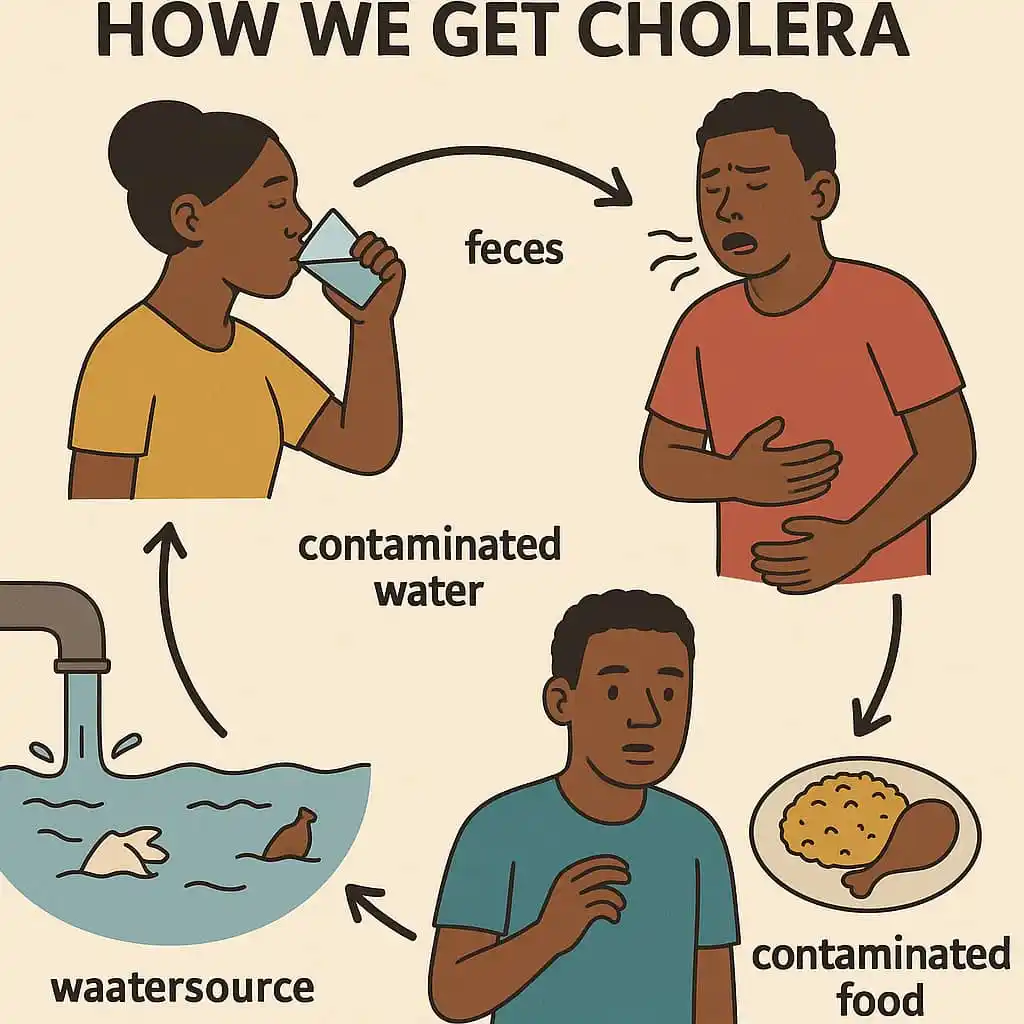
WEALTH, HEALTH, RELATIONSHIP AND WISDOM HUB
June 9, 2025 at 01:41 PM
*UNDERSTANDING CHOLERA: WHAT IT IS, HOW WE GET IT, AND NATURAL WAYS TO MANAGE IT*
Cholera is an acute diarrhoeal disease caused by the bacterium Vibrio cholerae. It is commonly spread through contaminated water and food, especially in areas with poor sanitation and limited access to clean drinking water—conditions that sadly persist in parts of Ghana and many developing regions.
How Do We Get Cholera?
The primary route of cholera transmission is the faeco-oral route. Here's how it happens:
1. Contaminated Water: When human waste (faeces) containing Vibrio cholerae contaminates water sources—like rivers, wells, and even household water stored improperly—anyone who drinks or uses that water for cooking, washing fruits, or brushing teeth is at risk.
2. Contaminated Food: Food prepared or washed with contaminated water, or handled by someone with unclean hands, becomes a vehicle for the bacteria. Popular street foods and open-market items can be dangerous if hygiene is not prioritized.
3. Poor Sanitation: Open defecation, unclean latrines, and poor handwashing culture are major contributors to the spread of cholera in Ghana. Rainfall and floods can also spread the bacteria quickly through water channels.
Symptoms of Cholera
Profuse watery diarrhea (often described as “rice water” stools)
Vomiting
Rapid dehydration
Muscle cramps
Weakness and shock in severe cases
Without prompt treatment, cholera can lead to death within hours due to severe dehydration.
Conventional Treatment (Brief Overview)
In hospitals and clinics, cholera is treated with:
Oral Rehydration Salts (ORS)
Intravenous (IV) fluids for severe dehydration
Antibiotics in some cases, to reduce the duration of illness
Zinc supplements (especially in children) to aid recovery
Natural Remedies and Home-Based Management
Note: These are supportive measures and must be used alongside or while seeking medical care—especially for severe cases.
1. Homemade Oral Rehydration Solution (ORS)
This is the most critical natural remedy.
How to prepare:
1 litre of clean, boiled and cooled water
6 teaspoons of sugar
1/2 teaspoon of salt
Mix well. Give small amounts frequently to prevent dehydration.
2. Coconut Water
Rich in electrolytes like potassium and magnesium, coconut water is excellent for rehydration and energy during mild cholera cases.
3. Guava Leaves Tea
Guava leaves are traditionally known in Uganda to help reduce diarrhea.
Preparation:
Boil 5–10 guava leaves in water for 10 minutes
Allow to cool, strain, and drink 2–3 times daily
4. Activated Charcoal
Charcoal binds toxins and can help in managing diarrhea.
1 teaspoon of edible charcoal powder mixed with clean water can be taken 1–2 times daily.
5. Neem (Nim) Leaves
Neem has strong antimicrobial properties. Neem water or tea may help the immune system fight the bacteria.
6. Fermented Foods (like kenkey water or pito)
These can help replenish beneficial gut bacteria and strengthen digestion post-infection.
How to Prevent Cholera (Natural & Lifestyle Tips)
Boil water before drinking or use water purification tablets
Wash hands with soap regularly, especially before eating and after using the toilet
Avoid street food or ensure it is hot and freshly prepared
Disinfect fruits and vegetables with salt or vinegar before eating
Educate family and community about cholera spread and hygiene
Use and maintain clean toilets—no open defecation
Final Thoughts from Israel Mensah Gothar (Good Living Ghana)
Cholera is not just a medical issue—it is a public health, sanitation, and education issue. We can’t always rely solely on hospitals. Empowering our communities with knowledge of natural remedies and proper hygiene practices can save lives.
Let us promote clean water, natural care, and informed health habits. Share this message with others—you could be saving a life!

❤️
1